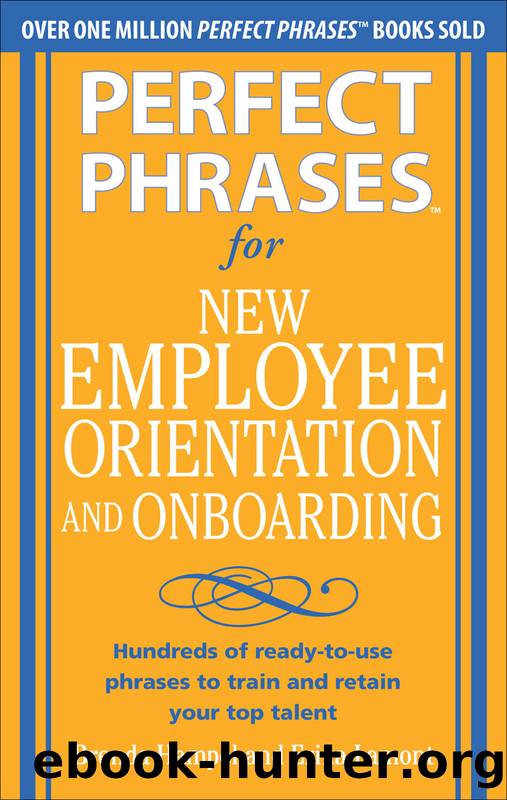Perfect Phrases for New Employee Orientation and Onboarding by Brenda Hampel & Erika Lamont

Author:Brenda Hampel & Erika Lamont
Language: eng
Format: epub
Publisher: McGraw Hill LLC
Published: 2011-10-15T00:00:00+00:00
Perfect Phrases from the Hiring Manager to Encourage Success in the Culture
The hiring manager and/or HR partner play a key role in helping the new employee understand and adapt to the culture of the organization. These âgetting the cultureâ phrases hold true for most organizations, but it is important to change them to reflect the actual culture of a particular organization as these coaching opportunities present themselves.
Input from a hiring manager should be focused on the department and the role as well as the broader organization. The hiring manager has the unique perspective of a line manager responsible for leading her team and delivering results. She is also the individual who will be evaluating the onboarding success and longer-term performance of the new hire.
Observe everything and try not to judge whether it is the ârightâ or âwrongâ way to do it.
Assume nothing, ask.
Watch and listen.
Remember there is usually more than one âright answer.â
If you make a mistake, find out why and how to improve.
Speak up (or listen carefully) at the meetings you attend.
Make sure that you are clear about your role and performance expectations for your first 30, 60, and 90 days.
We are pretty formal (informal) here, so your communication needs to look like ________________________________________.
The way we use e-mail is ________________________________________.
Deliver on your commitments.
Expect surprises about your role, your partners, and the organization.
If you have a new idea, the best way to âsell itâ is to _____________
.
Make sure that you understand the history and ownership of anything that you want to change.
Early on, avoid high-risk initiatives; find âearly winsâ or âquick hitsâ to establish credibility.
Itâs OK (not OK) to be late for meetings.
Download
This site does not store any files on its server. We only index and link to content provided by other sites. Please contact the content providers to delete copyright contents if any and email us, we'll remove relevant links or contents immediately.
Hit Refresh by Satya Nadella(9133)
The Compound Effect by Darren Hardy(8966)
Change Your Questions, Change Your Life by Marilee Adams(7780)
Nudge - Improving Decisions about Health, Wealth, and Happiness by Thaler Sunstein(7706)
The Black Swan by Nassim Nicholas Taleb(7129)
Deep Work by Cal Newport(7083)
Rich Dad Poor Dad by Robert T. Kiyosaki(6632)
Daring Greatly by Brene Brown(6513)
Principles: Life and Work by Ray Dalio(6447)
Playing to Win_ How Strategy Really Works by A.G. Lafley & Roger L. Martin(6304)
Man-made Catastrophes and Risk Information Concealment by Dmitry Chernov & Didier Sornette(6019)
Big Magic: Creative Living Beyond Fear by Elizabeth Gilbert(5771)
Digital Minimalism by Cal Newport;(5764)
The Myth of the Strong Leader by Archie Brown(5507)
The Slight Edge by Jeff Olson(5417)
Discipline Equals Freedom by Jocko Willink(5389)
The Motivation Myth by Jeff Haden(5212)
The Laws of Human Nature by Robert Greene(5208)
Stone's Rules by Roger Stone(5087)
